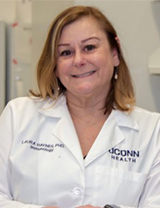What Is the Biomarkers and Preclinical Research Core?
The Biomarkers and Preclinical Research Core assists investigators with the expertise and various tools needed to integrate biomarkers, drivers of aging and underlying mechanisms of chronic diseases in humans and animal models in order to promote function and independence in the late stages of life.
The Biomarkers and Preclinical Research Core aims to:
- Assist investigators in the development of experimental protocols involving biomarkers of aging and related conditions such as chronic diseases, resilience, frailty and disability to achieve the goals of the project
- Develop a biobank and biomarker discovery accessible to Pepper Center investigators.
Services
Mouse Models
Mouse models are developed and maintained for use in preclinical testing of interventions targeting specific geriatric conditions. Mouse strength and mobility, body composition, cognitive testing, bone density, host defense and bladder function can all be assessed.
Biomarkers
This core assists investigators wishing to add biomarkers to geriatric research studies. Biomarker capacities include a Luminex FLEXMAP 3D multiplex system, quantitative PCR and ELISA. Additional analytic capacities are also available in terms of measurement of dietary antioxidants and phytochemicals (e.g., polyphenols and metabolites), lipids, oxidative stress markers, and metabolomics. Access to transcriptomic analyses (such as single cell RNA-seq, single cell ATAC-seq and CITE-seq) and microbiome analyses are also available.
Samples collected from human (collected by RC2) and mouse (collected by RC3) studies
Cells & Tissues |
Fluids |
Mouse Whole Body |
| Microscopy | Protein quantification | Behavior/strength |
| Computational modeling | Proteomics/Metabolomics | Metabolism |
| Flow cytometry | Frailty assessment | |
| Bone analysis | In vivo imaging | |
| Cellular metabolism | Urodynamics | |
| Real-time PCR | ||
| Single-cell sequencing | ||
| Genomics | ||
| Transcriptomics | ||
| Microbiome analysis | ||
| Sample prep services |
Analysis of results will be carried out in collaboration with specific content experts and the RC2 Data and Analysis Core.
References and Other Training Materials
A tissue ubiquitous gene set for cellular senescence
BEST (Biomarkers, EndpointS, and other Tools) Resource
Biolearn, an open-source library for biomarkers of aging
Biomarkers of aging for the identification and evaluation of longevity interventions
Blood Biomarkers for Healthy Aging
ELISA and Multiplex Technologies for Cytokine Measurement in Inflammation and Aging Research
Frailty Screening Using the Electronic Health Record Within a Medicare Accountable Care Organization
KeepEX, a simple dilution protocol for improving extracellular vesicle yields from urine
Organ aging signatures in the plasma proteome track health and disease
Moving towards the detection of frailty with biomarkers: A population health study
Application
The success of the UConn Pepper Center relies on our ability to share our research, tools, and findings with other researchers, practitioners and the community. If you are interesting in learning more about how one or more of the cores can be of assistance.
Faculty & Staff Contacts
General Contact: 860-679-1339

Core Leader
Laura Haynes, Ph.D.
Professor
Email: lhaynes@uchc.edu
Dr. Haynes is a professor at the University of Connecticut School of Medicine. She is a core faculty member in the UConn Center on Aging and also holds an appointment in the Department of Immunology. She has over 25 years’ experience studying how aging impacts adaptive immune responses, including the response to vaccinations and infections. Her pioneering work described intrinsic age-related changes in CD4 helper T cells and she has now gone on the study how the extrinsic aging/senescent environment impacts immunity. In addition, she has also expanded her studies to examine how aging and influenza infection impact skeletal muscle gene expression and physical function parameters in order to understand why older adults often exhibit decreased mobility following influenza infection. Her work has been funded continuously by NIH (NIA and NIAID) since her first faculty appointment. In addition to her research, Dr. Haynes is the leader of the Center on Aging Biomarkers Core and has worked with other investigators (both basic science and clinical faculty) to obtain samples or sample analyses for their studies.

Core Manager
Whitney Wolf
Email: wwolf@uchc.edu
Whitney Wolf is the Manager of the Biomarker Core at The UConn Pepper Center on Aging. She is a certified Molecular Technologist with the American Society for Clinical Pathology. Ms. Wolf started her career at the UNC Marsico Lung Institute working on genetic modifiers of Cystic Fibrosis and the genetics of Primary Ciliary Dyskinesia. She also worked in the School of Pharmacy at UNC in antibody and viral production. Ms. Wolf has extensive experience in handling and processing a variety of human specimens, with an understanding to maintain the samples integrity for future analysis.

Core co-Leader
Paul Robson, Ph.D.
Professor
The Jackson Laboratory
Email: paul.robson@jax.org
Dr. Robson received his Ph.D. (Biochemistry) from the University of Toronto and did his research at the Hospital for Sick Children. After postdoctoral studies at the Children’s Hospital of Philadelphia he established his research lab at the Genome Institute of Singapore. He began implementing single cell technologies in 2008 to understand the molecular control of cell fate decisions in early embryonic development. He joined The Jackson Laboratory in 2014 and established and directed the Single Cell Biology Laboratory which oversees the development, testing and implementation of single cell technologies relevant to research programs at JAX and the University of Connecticut. Dr. Robson utilizes single cell and spatial mapping tools to define senescent cells in aging human and mouse tissues in his role as PI on SenNet Tissue Mapping Center grants (NIH Common Fund). He also has specific interests in early embryonic development, in vitro modeling of human implantation, and how the biology at this stage may provide insight into and/or impact later in life biology (e.g., aging) through the pleiotropic effects of genes undergoing natural selection at these early post fertilization stages.

Core co-Leader
Breno S. Diniz, M.D., Ph.D.
Associate Professor
Email: diniz@uchc.edu
Dr. Diniz is an Associate Professor at the University of Connecticut School of Medicine. He is a core faculty member in the UConn Center on Aging and also holds an appointment in the Department of Psychiatry and Public Health Sciences. He has over 10 years of research experience in planning and executing biomarker studies in observational and clinical trials. His work has broadly focused on the development of multi-modal biomarkers for neuropsychiatric and age-related conditions using precision gerontology tools. His work has pioneered the investigation of how serious mental illnesses in older adults negatively affect multiple hallmarks of biological aging and how such changes can lead to a higher risk of adverse health outcomes in this population. His work has been supported by the NIH (NIA and NIMH).

Shuzhao Li, Ph.D.
Associate Professor
The Jackson Laboratory
Email: shuzhao.li@jax.org
Dr. Li is an associate professor at The Jackson Laboratory for Genomic Medicine, and a visiting Associate Professor at Department of Immunology, University of Connecticut School of Medicine. His research employs ultrahigh-resolution mass spectrometry to measure in human samples the metabolome, lipidome and small molecules of dietary, microbial and environmental origins. This is supported by innovative sample enrichment and data acquisitions, and computational algorithms that identify pathway patterns and integrate chemical reactions and biology.

Julia Oh, Ph.D.
Associate Professor
The Jackson Laboratory
Email: julia.oh@jax.org
Julia Oh has a Ph.D. in Genetics from Stanford University. Dr. Oh’s goal in her work at Jackson Laboratory is to develop microbiome therapeutics to treat human disease by using diverse tools like genomics and synthetic biology. Dr. Oh has extensive computational expertise in high-resolution genomic reconstructions of the microbiome, comparative genomics expertise, and strain biology, a major frontier in understanding the functional diversity of the microbiome. We complement our genomic approaches with experimental expertise in genetic manipulation and high-throughput screening of non-traditional model organisms.